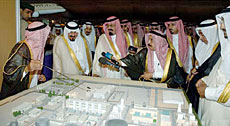JEDDAH, 2 November 2006 — Custodian of the Two Holy Mosques King Abdullah yesterday laid the foundation for a SR600 million complex of four university colleges in Najran and instructed higher education officials to convert the complex into an independent university.
“King Abdullah issued his directives while launching a number of welfare projects (worth SR3.35 billion) in Najran last night,” Higher Education Minister Dr. Khaled Al-Anqari said, adding that the new educational complex would have four colleges for applied medical science; computer science and information systems; sciences; and community. The project, covering an area of 18 million square meters east of Najran city, will accommodate 12,000 students and also includes a medical city, a research center and a sports and recreation city.
Abdullah also laid the foundation for an SR90 million expansion of Najran Airport, which includes building of new passenger lounges and runways. He launched an SR400 million project to pump water to Najran from the Empty Quarter as well as other new electricity projects worth SR800 million.
In the health sector, the king laid the foundation for a 200-bed hospital, a college of health for girls, a diabetic center, a health care center and a 50-bed hospital. He also launched new school projects worth SR889 million and vocational training centers and technical institutes worth SR200 million.
The new welfare and infrastructure projects underlined the king’s statement on Tuesday that the region was heading for a new era of progress and prosperity. “I would like to tell you the good news that Najran, God willing, is heading for a new phase of progress and prosperity that will provide its people with a life of affluence and happiness,” the king told a reception organized in his honor by the people of Najran.
Emphasizing the Kingdom’s strategy of balanced growth for all regions, Abdullah said the government would not differentiate between the Kingdom’s regions and citizens. In his keynote address, the king also said that those who had conspired to create divisions between the state and its people had failed. He was apparently referring to the Najran riots that took place in April 2000.
In a humanitarian gesture, he ordered the release of a number of people held in connection with the Najran riots. Those who carried weapons were not included in the amnesty. He also commuted the punishment of rioters who were sentenced to death to jail terms. According to informed sources, the royal amnesty will benefit some 50 prisoners.
Maj. Gen. Ali Al-Harithy, director general of prisons, said all prisoners who came under the amnesty would be set free within a few days. He said nearly 13,000 prisoners had been released under the two previous amnesties declared by the king during the past five months.
On Dec. 13, 2002, the government released nine of the 70 Saudis sentenced to jail terms for their role in the Najran riots. King Fahd halved the sentences of 70 Saudis involved in the unrest, just one week after commuting the death sentences of 17 others to 10 years in jail. The decision was taken after the prisoners and their families submitted, according to press reports “apologies and repented for their deeds.”
The riots took place following the arrest of a Yemeni who was allegedly practicing and teaching black magic in the city. The rioters opened fire at the governorate headquarters.
Meanwhile, Crown Prince Sultan said the king’s current tour was in line with his plan to achieve balanced growth for all Saudis and regions. “Balanced development for all regions is the government’s strategic goal,” he told the Saudi Press Agency.
The new educational and infrastructure projects ordered by the king reflect his desire to achieve balanced growth in all parts of the country. The crown prince said the new projects would create job opportunities for thousands of young Saudis. “As a result, there will not be any unemployed among Saudi youth as all of them will be provided jobs within the next five years,” the crown prince said.
King Abdullah arrived in Najran on Tuesday on the first leg of a tour of the south, which will also take him to Asir and Jizan. Asir Gov. Prince Khaled Al-Faisal welcomed the king to Asir on behalf of the people of the region. This is the king’s first visit to Asir after coming to the throne in August 2005.


